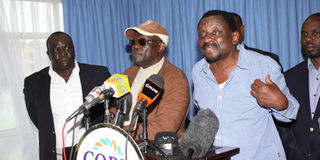Our politicians are tearing the country right down the middle

Cord politicians Johnstone Muthama (centre), Reuben Ndolo (left) and James Orengo (right) speaks to the place at Capitol Hill offices in Nairobi on May 13, 2016. They said that they will continue to protest countrywide over IEBC commissioners on Monday to ensure that the official leave the office. PHOTO | ANTHONY OMUYA | NATION MEDIA GROUP
What you need to know:
- The perception that people in government have the powers to rig an election, steal billions, murder critics, and so forth reinforces the idea that politics is ultimately a zero sum game.
- There is an increasing tendency for government critics to view everything through a Machiavellian lens.
- Even before evidence is provided, many immediately assume the self-interested, greedy and unaccountable hand of political elites.
It is clear that Kenyans are becoming increasingly divided in their evaluation of the current government. For some, the government is doing a credible job in difficult times. For many others, the government is plagued by corruption, greed, and impunity.
This divide has recently been brought into sharp relief by a number of debates. This includes allegations by opposition politicians that the Independent Electoral and Boundaries Commission (IEBC) is planning to ensure Jubilee’s victory in next year’s election, and by the rumours surrounding the untimely death of businessman, Jacob Juma.
It sometimes seems that these debates are limited to the political elite, and that the majority looks on with apathy. This impression is reinforced by media coverage of elite positioning, as Odinga, for example, makes public statements about the IEBC, which are then ridiculed by Jubilee. Or Wetangula claims that a senior person in the government had threatened Juma, and the police demand that he records a statement.
However, a quick look at the online comments — or everyday discussions — reveal that this divide goes down to the very local level, is growing, and often has a strong ethnic dimension.
At one level, this is unsurprising and unproblematic: governments the world over have their supporters and critics. At another level, the depth of feeling amongst the government’s opponents is problematic for a number of reasons. Let me mention a couple.
First, the perception that people in government have the powers, and enjoy the impunity, to rig an election, steal billions, murder critics, and so forth reinforces the idea that politics is ultimately a zero sum game. Or, in other words, that political power is all about winning the presidency.
This notion of centralised power is something that the new Constitution and, in particular, devolution was meant to counter. And, in the 2013 elections, it does seem that, the fact that many who ‘lost nationally won locally’, helped dampen popular frustrations with the presidential results amongst CORD supporters.
GRAND CORRUPTION SCANDALS
However, today, there is an increasing sense that it is still the presidency that matters, and which ultimately determines such critical issues as political freedoms and security.
Second, there is an increasing tendency for government critics to view everything through a Machiavellian lens. Such that, even before evidence is provided, many immediately assume the self-interested, greedy and unaccountable hand of political elites.
This is problematic as it renders many citizens unwilling to contribute to government projects. As one man noted to me the other day, why should he pay tax on all his business interests when the money is “just going to be stolen.”
Finally, there is a trickle down effect. For example, current corruption levels are due in large part to a return of grand corruption scandals alongside the localisation of corruption through devolution, but it is also due to people following the signals of their superiors. In short, there seems to be a burgeoning culture of: if he can get away with, so can I.
The point is not that CORD’s allegations about the IEBC or Jacob Juma are correct. I have no idea whether or not the IEBC is planning anything beyond their public strategic plans. I also have no idea whether Juma was threatened and, if so, by whom, and whether or not he was the victim of a politically motivated execution.
Instead, the point is that growing dissatisfaction with the government amongst large sections of the population — especially when these correlate with partisan, regional, and thus ethnic divisions — constitutes a barrier to development, encourages poor governance at the lower levels, and fosters inter-ethnic tension.
As a result, it is time for more thought to be given to how the country’s political temperature can be brought down, and to what conciliatory steps can be taken. This is not to suggest that leaders should simply bow to pressure from their opponents, but that they should take more concerted steps to show that they really do consider the publics interests and concerns.
Gabrielle Lynch is an Associate Professor of Comparative Politics, University of Warwick, UK. [email protected]; @GabrielleLynch6





